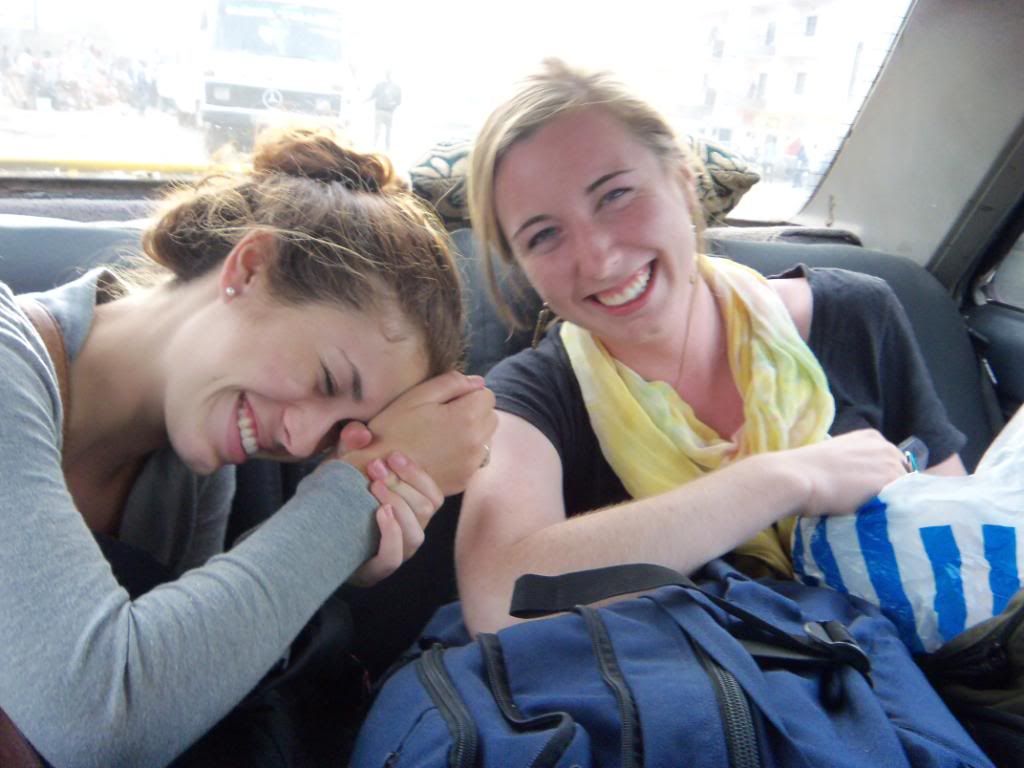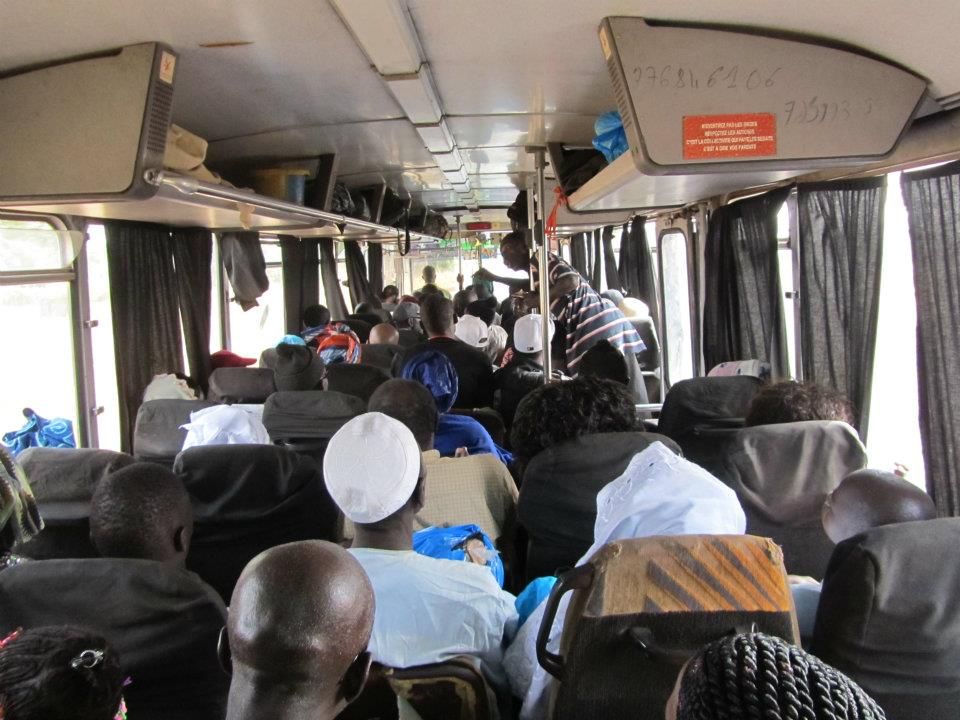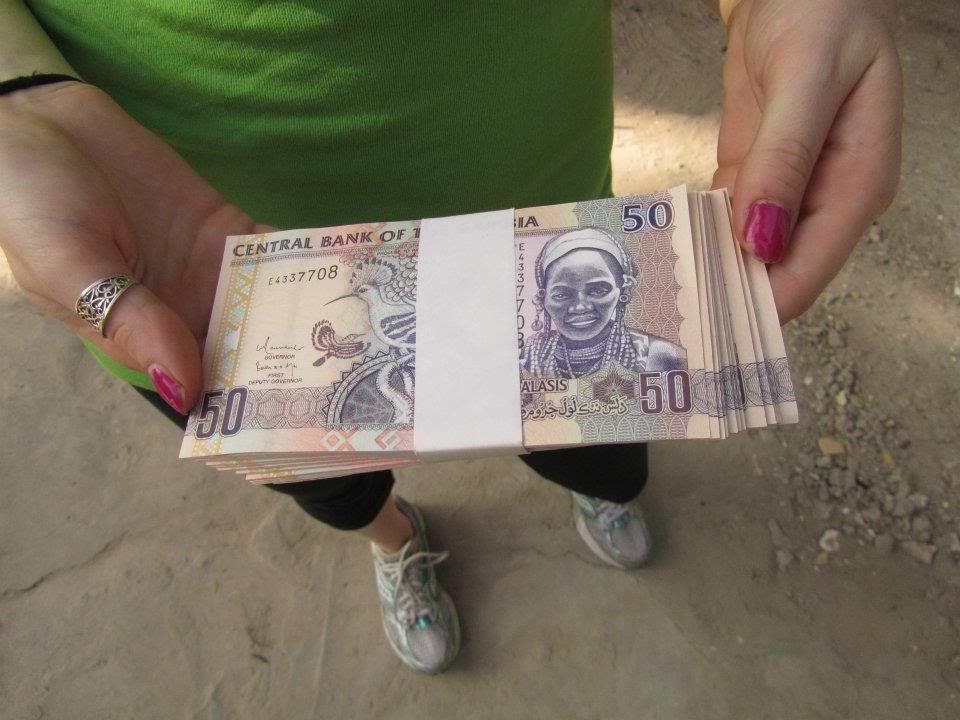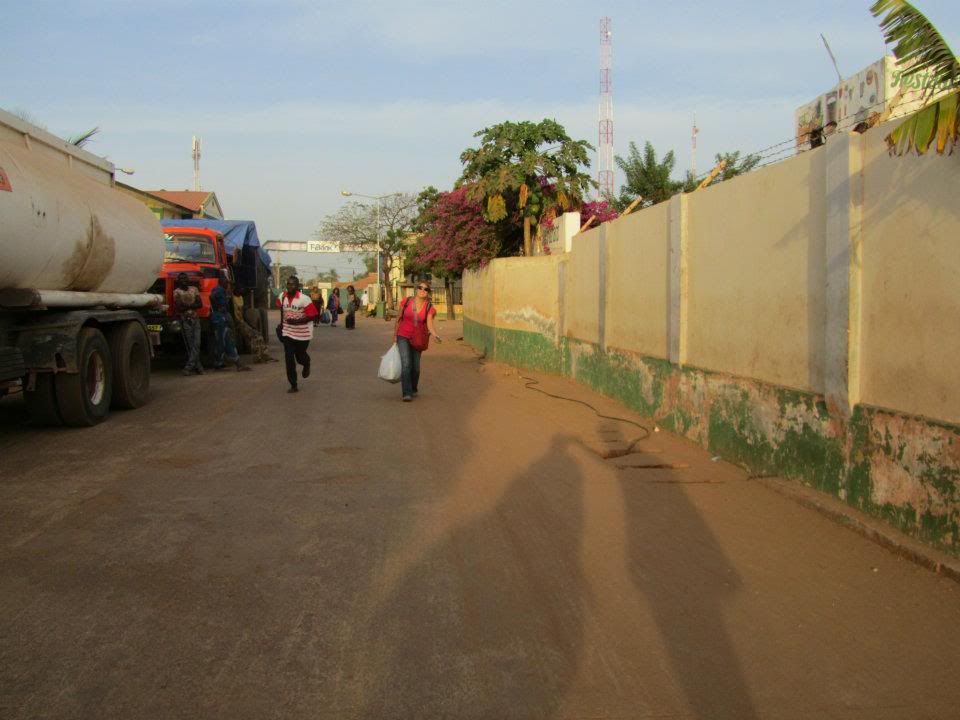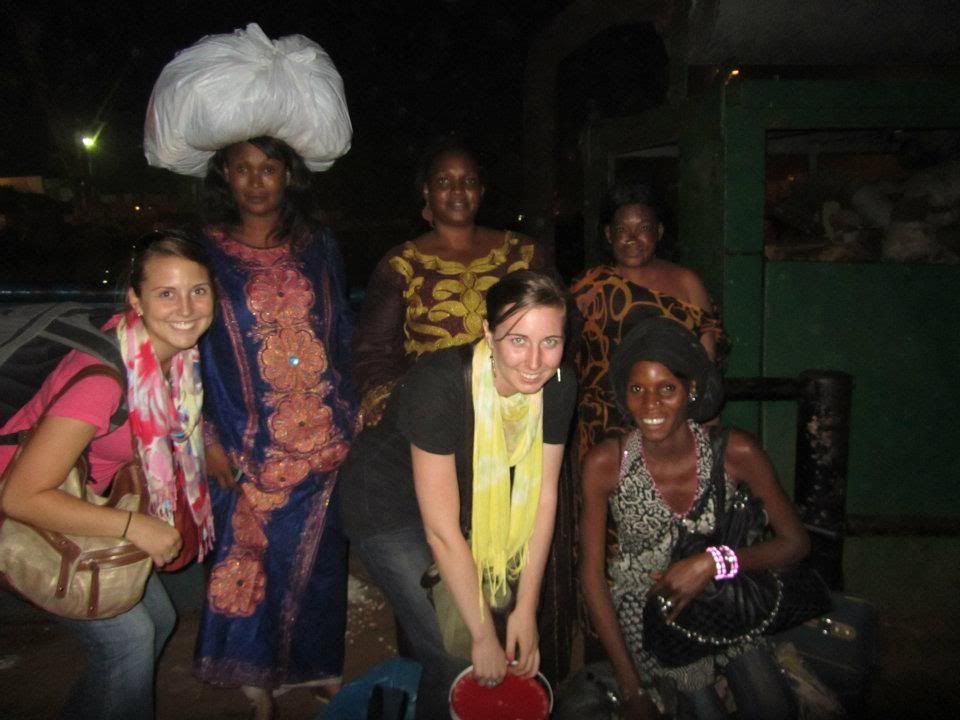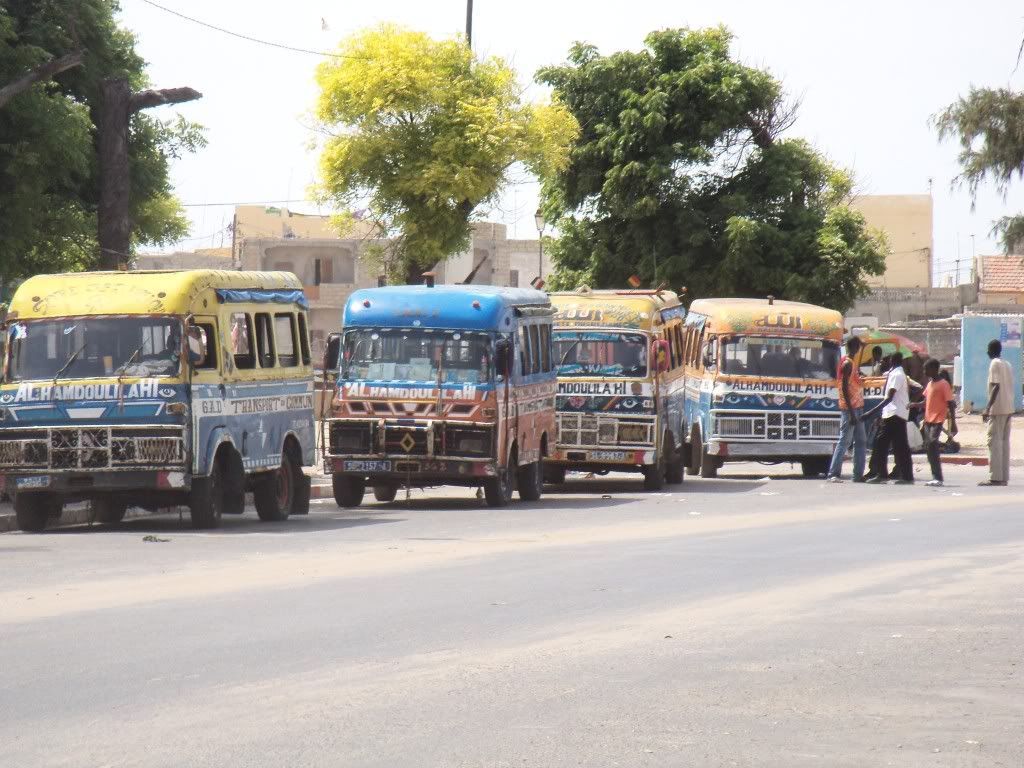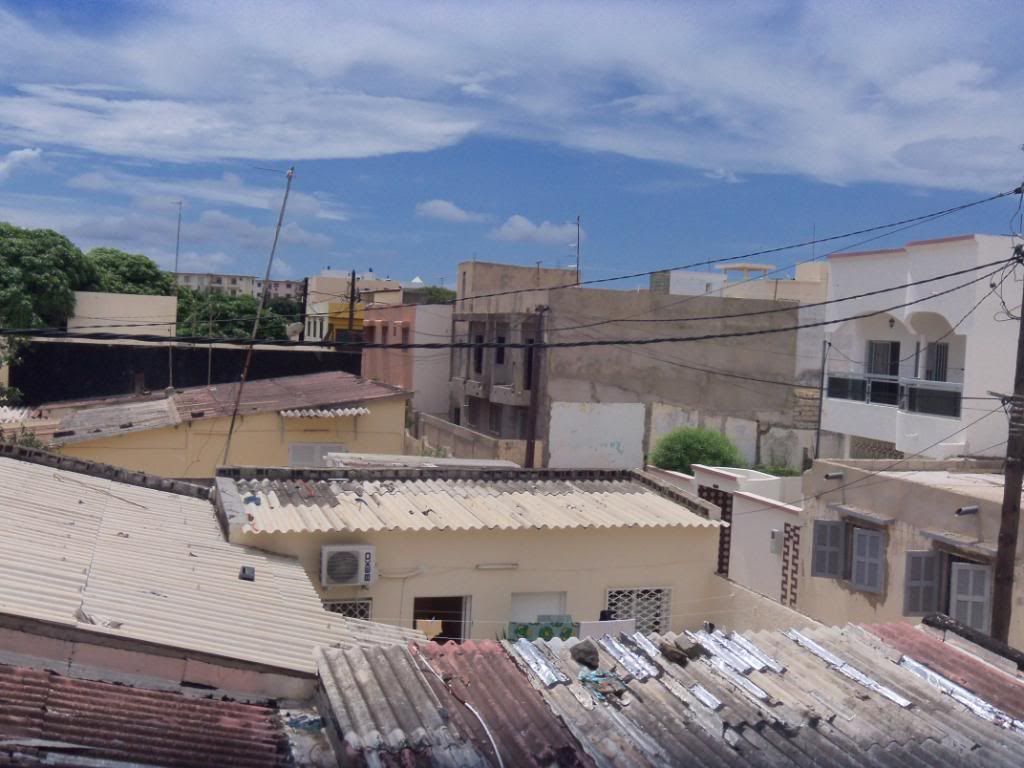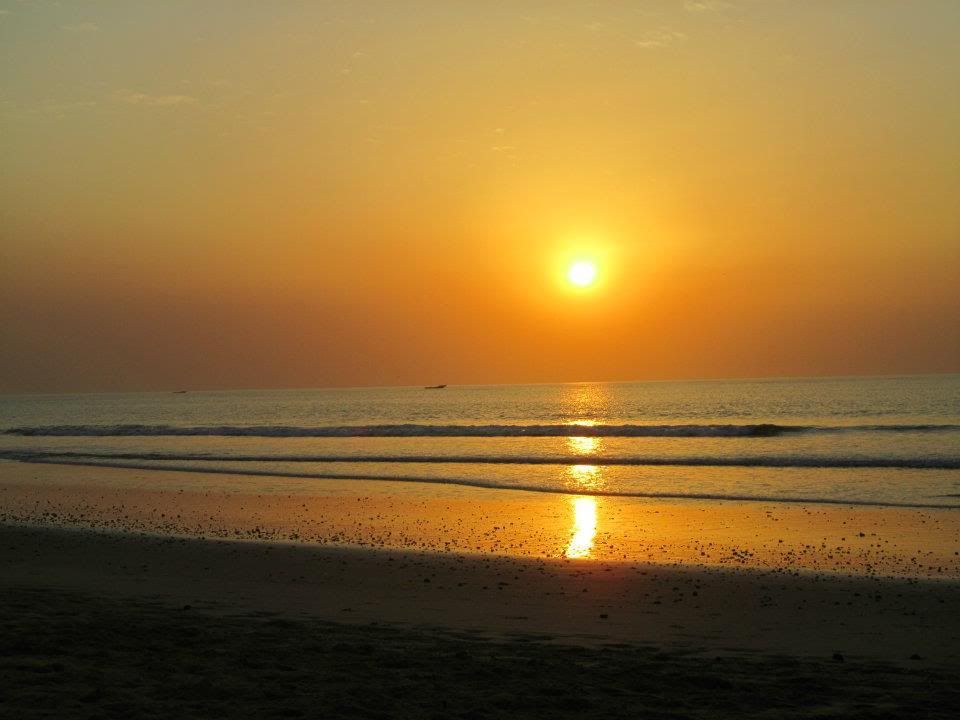Check out this link to Ellen's blog if you're interested in reading about our experience giving blood last week.
http://abroadindakar.blogspot.com/2012/01/giving-blood-cross-cultural-experience.html
As I study abroad in Dakar, Senegal for six months, I'm learning to accept the unavoidable imperfection of myself and the world I live in, or how to pee a little.
Tuesday, January 17, 2012
Getting to Gambia
The previous entry was a very basic explanation of travel within the city, which Ellen, Lauren, and I had more or less mastered learned to stumble through when we left on a week-long trip to Gambia. Turns out more long-distance travel is basically organized the same, except it's a little more expensive and time-consuming if when you mess up.
The day before we left for our week-long trip to Gambia, we still had virtually no plans, aside from the visas we had already gotten and directions from a staff-member at the Baobab Center to take a specific bus at 8am to take us directly to Gambia the next day. Well, the next day we hailed a taxi and explained the garage we needed him to take us to (all we had was the name of the place, of course he didn't speak French, and he didn't know where it was, so he pulled over a few times to ask directions). We made it to the garage with plenty of time to spare, but a kind gentlemen informed us upon arrival that our bus wasn't supposed to leave until 8 PM that night. Thus, one-half of the preparations we made for this trip were already null and void before we even left the city. What then followed was an hour of our angel of a driver taking us to various other garages and inquiring about transport to Gambia, including about 15 minutes of what appeared to be him standing, waiting for another bus on the other side of a 4 lane highway. I say "appeared to" because we didn't understand a single thing that man said to us, and really had no idea what was happening. Meanwhile, we were waiting in the car, trying (unsuccessfully) not to burst into hysterics (pictured below).
Still haven't left Dakar, and it was then 10am. A bus finally drove up, our driver bargained the collective ticket price of 4,500CFA (about $3 each), and helped us get on board. We said goodbye to our driver, thanked him profusely, and gave him a snickers bar and what I hope was a generous tip.
Once we got settled in the bus, we breathed a collective sigh of relief: Finally, on our way to Gambia! Sometime shortly after that feeling of relief, we noticed the entire bus was crawling with mosquitoes. I spent the rest of the ride dozing in and out of sleep, shooing mosquitoes away from my head, and sweating. It was getting to be the hottest time of day, and the bus was stopping way too often for the breeze from the windows to do much good. We were on that damn bus for just about 4 hours. And it didn't even take us all the way to Gambia; only about two thirds of the way. Once we got off, we used a bathroom at the gas station, bought some cold drinks, and met a couple gas attendants who claimed us as their girlfriends. The town is called Kaolack, and is a bustling travel hub for Senegal. When we were ready to start the next leg of the trip, we left the gas station and were immediately swarmed by six or seven men fighting with each other to see who would get to be our escort to the appropriate transport.
**This is how Senegalese "garages" operate: they're large sandlots pack-jammed with vans, buses, and sept-places (station wagons) loosely organized by travel destination. When you arrive, you're rushed by men who know their way around, asking where you want to go. One of them takes you where you need to be (I suspect he also earns a small tip from that driver for bringing him passengers).
After a bit of scrambling, Wolof arguing, and being lead in circles, we found a large van headed to the border. That ride took another 2 hours, but the other passengers were very friendly. We were all dropped off at the border, where our names, passport numbers, and occupations were very officially recorded in blue ballpoint pen in a giant notebook. Next step: exchange Senegalese CFA for the Gambian currency, Dallasi. Gambia was colonised by the British, so English is their national language. Dallasi is their pigeon-english version of Dollars. About 30 Dallasi equals 500 CFA, or $1.
On the other side of the border, we directly boarded another bus for 21 Dallasi and arrived in the capital city of Banjul in a mere 45 minutes. There, we followed our new travel companions (a group of older Gambian women headed by Mami, who passionately fought for my honor at the border when a woman giving me Dallasi for CFA tried ripping me off) to the ferry to cross the bay to Bakau, where we decided we would be spending our first night.
Mami knew it was the last ferry of the day, so she was rushing everyone to move quicker. I bought tickets for everyone, and we started across the bridge. We all stopped, however, when someone pointed out the bags and the old woman (who turned out to be her mother) Mami left at the gate. Knowing we were running late, Ellen and I didn't bother to ask questions before grabbing the two large, lumpy garbage bags. Mami kept yelling at us, "Run!", which was a bit funny, since we were all weighed down by heavy luggage, and the older women weren't really capable of going much faster than what was a brisk walk for us young'uns.
Luckily, we all made it onto the ferry, but it was only a few minutes once we were on before it pulled away from the dock. The ride was supposed to take 45 minutes, but we had a little detour. The other ferry's engine had either broken down or run out of gas, and we had to tow it to the other side of the bay with us. It was two hours later, and about 9:30pm when we were finally able to de-board (Ellen and I were still carrying Mami's bags). Furthermore, it wasn't until now that we tried calling the hotel and realized our Senegalese phones didn't work.
Mami saved us again by letting us use her phone to call, and she bargained the price of a taxi to take us there. At this point, we had been travelling upwards of 13 hours, and were quickly losing mental functionality. I was incredibly grateful for Mami's kindness and generosity. Oh yeah, and did I mention that the entire trip to Gambia was only supposed to take 4-5 hours total?
Basically, we were completely dependent on the good will and ability of others to show us where to go and what to do. Aside from the time I accidentally got in a bus headed for Ziguinchor (a region of Senegal south of Gambia), the good will of local people generally lead us in the correct direction.
The day before we left for our week-long trip to Gambia, we still had virtually no plans, aside from the visas we had already gotten and directions from a staff-member at the Baobab Center to take a specific bus at 8am to take us directly to Gambia the next day. Well, the next day we hailed a taxi and explained the garage we needed him to take us to (all we had was the name of the place, of course he didn't speak French, and he didn't know where it was, so he pulled over a few times to ask directions). We made it to the garage with plenty of time to spare, but a kind gentlemen informed us upon arrival that our bus wasn't supposed to leave until 8 PM that night. Thus, one-half of the preparations we made for this trip were already null and void before we even left the city. What then followed was an hour of our angel of a driver taking us to various other garages and inquiring about transport to Gambia, including about 15 minutes of what appeared to be him standing, waiting for another bus on the other side of a 4 lane highway. I say "appeared to" because we didn't understand a single thing that man said to us, and really had no idea what was happening. Meanwhile, we were waiting in the car, trying (unsuccessfully) not to burst into hysterics (pictured below).
Still haven't left Dakar, and it was then 10am. A bus finally drove up, our driver bargained the collective ticket price of 4,500CFA (about $3 each), and helped us get on board. We said goodbye to our driver, thanked him profusely, and gave him a snickers bar and what I hope was a generous tip.
Once we got settled in the bus, we breathed a collective sigh of relief: Finally, on our way to Gambia! Sometime shortly after that feeling of relief, we noticed the entire bus was crawling with mosquitoes. I spent the rest of the ride dozing in and out of sleep, shooing mosquitoes away from my head, and sweating. It was getting to be the hottest time of day, and the bus was stopping way too often for the breeze from the windows to do much good. We were on that damn bus for just about 4 hours. And it didn't even take us all the way to Gambia; only about two thirds of the way. Once we got off, we used a bathroom at the gas station, bought some cold drinks, and met a couple gas attendants who claimed us as their girlfriends. The town is called Kaolack, and is a bustling travel hub for Senegal. When we were ready to start the next leg of the trip, we left the gas station and were immediately swarmed by six or seven men fighting with each other to see who would get to be our escort to the appropriate transport.
**This is how Senegalese "garages" operate: they're large sandlots pack-jammed with vans, buses, and sept-places (station wagons) loosely organized by travel destination. When you arrive, you're rushed by men who know their way around, asking where you want to go. One of them takes you where you need to be (I suspect he also earns a small tip from that driver for bringing him passengers).
After a bit of scrambling, Wolof arguing, and being lead in circles, we found a large van headed to the border. That ride took another 2 hours, but the other passengers were very friendly. We were all dropped off at the border, where our names, passport numbers, and occupations were very officially recorded in blue ballpoint pen in a giant notebook. Next step: exchange Senegalese CFA for the Gambian currency, Dallasi. Gambia was colonised by the British, so English is their national language. Dallasi is their pigeon-english version of Dollars. About 30 Dallasi equals 500 CFA, or $1.
On the other side of the border, we directly boarded another bus for 21 Dallasi and arrived in the capital city of Banjul in a mere 45 minutes. There, we followed our new travel companions (a group of older Gambian women headed by Mami, who passionately fought for my honor at the border when a woman giving me Dallasi for CFA tried ripping me off) to the ferry to cross the bay to Bakau, where we decided we would be spending our first night.
Mami knew it was the last ferry of the day, so she was rushing everyone to move quicker. I bought tickets for everyone, and we started across the bridge. We all stopped, however, when someone pointed out the bags and the old woman (who turned out to be her mother) Mami left at the gate. Knowing we were running late, Ellen and I didn't bother to ask questions before grabbing the two large, lumpy garbage bags. Mami kept yelling at us, "Run!", which was a bit funny, since we were all weighed down by heavy luggage, and the older women weren't really capable of going much faster than what was a brisk walk for us young'uns.
Luckily, we all made it onto the ferry, but it was only a few minutes once we were on before it pulled away from the dock. The ride was supposed to take 45 minutes, but we had a little detour. The other ferry's engine had either broken down or run out of gas, and we had to tow it to the other side of the bay with us. It was two hours later, and about 9:30pm when we were finally able to de-board (Ellen and I were still carrying Mami's bags). Furthermore, it wasn't until now that we tried calling the hotel and realized our Senegalese phones didn't work.
Mami saved us again by letting us use her phone to call, and she bargained the price of a taxi to take us there. At this point, we had been travelling upwards of 13 hours, and were quickly losing mental functionality. I was incredibly grateful for Mami's kindness and generosity. Oh yeah, and did I mention that the entire trip to Gambia was only supposed to take 4-5 hours total?
Basically, we were completely dependent on the good will and ability of others to show us where to go and what to do. Aside from the time I accidentally got in a bus headed for Ziguinchor (a region of Senegal south of Gambia), the good will of local people generally lead us in the correct direction.
Thursday, January 12, 2012
Travel in Dakar: Car Rapides, Taxis, and Buses, Oh my!**
Something I've been meaning to do a blog entry on is the topic of travel in Senegal. My story of accidentally visiting Keur Massar (the crowded, very un-touristy and dusty town located on the edge of Dakar) instead of Keur Moussa (the very tourist-friendly monastery that sells a delightful variety of Senegalese fruit-flavored alcoholic beverages and jams located just outside of Dakar) illustrates the constant occurrence of unexpected travel hiccups, especially for travellers who aren't familiar with the way public transport is organized here.
When I use public transport, I'm used to going online to find a bus, metro, or train schedule, and then using a map to find my way to the appropriate station. Before coming to Senegal, I considered myself quite self-sufficient when it comes to maneuvering public transport. Nothing I learned from the various trips I've taken around the states and a couple in Europe, or in my home state of Michigan (which is a joke, since public transport barely even exists there), however, even came close to preparing me for Senegalese travel.
Getting around Dakar is cheap enough: in general, you can take a taxi just about anywhere in the city with $4.50 being the most expensive ride. And that rate stays the same whether you're alone or sharing that taxi with three other people. Finding a taxi is also (almost) never an issue. I think one of my professors told me that Dakar is a city with one of the highest taxi to privately owned car ratios in the world. I'm too lazy to see if that's accurate, so don't quote me on that, but believe me, there are taxis EVERYWHERE. The challenge lies in bargaining for that reasonable price, and then communicating to the driver your desired destination. Some drivers speak French fluently and are easier for me to communicate with, and others only speak Wolof. If I'm headed someplace I've been before, or a destination that's well known by the locals, I just say the name of the place, and the ride generally goes smoothly. It's when we try things like finding a new restaurant that our friend, Mr. Lonely Planet, recommends and gives us directions to using radical things like street names and maps that we run into real issues. Locals generally describe locations using landmarks, whereas street names change, are unmarked, or are simply unknown to the local population.
We quickly learned that asking for directions was the only way to navigate this city. Once we mastered the art of bargaining fair prices for taxi rides and knowing where we were going, we began taking cheaper forms of public transportation. This means car state-run buses and a handful of other types of privately owned van-like vehicles including car-rapides and ta-tas that run a set route within the city which cost between 20 and 60 cents per ride, and are reliably jam-packed with passengers (usually people are even hanging out the back of the van, balancing on the fender). These add another layer of difficulty, since the only way to know where one of these are headed is by asking locals or the "apprenti" who takes your fare as you board. This is also more time-consuming: these vans make frequent stops because more passengers equals more money.
A line of empty Car-Rapides
**The original title for this entry was "Lions, Taxis, and Buses, Oh My!" but I didn't end up using it since there aren't actually any lions in Dakar. I wish there were though, because that would've been so punny!
When I use public transport, I'm used to going online to find a bus, metro, or train schedule, and then using a map to find my way to the appropriate station. Before coming to Senegal, I considered myself quite self-sufficient when it comes to maneuvering public transport. Nothing I learned from the various trips I've taken around the states and a couple in Europe, or in my home state of Michigan (which is a joke, since public transport barely even exists there), however, even came close to preparing me for Senegalese travel.
Getting around Dakar is cheap enough: in general, you can take a taxi just about anywhere in the city with $4.50 being the most expensive ride. And that rate stays the same whether you're alone or sharing that taxi with three other people. Finding a taxi is also (almost) never an issue. I think one of my professors told me that Dakar is a city with one of the highest taxi to privately owned car ratios in the world. I'm too lazy to see if that's accurate, so don't quote me on that, but believe me, there are taxis EVERYWHERE. The challenge lies in bargaining for that reasonable price, and then communicating to the driver your desired destination. Some drivers speak French fluently and are easier for me to communicate with, and others only speak Wolof. If I'm headed someplace I've been before, or a destination that's well known by the locals, I just say the name of the place, and the ride generally goes smoothly. It's when we try things like finding a new restaurant that our friend, Mr. Lonely Planet, recommends and gives us directions to using radical things like street names and maps that we run into real issues. Locals generally describe locations using landmarks, whereas street names change, are unmarked, or are simply unknown to the local population.
We quickly learned that asking for directions was the only way to navigate this city. Once we mastered the art of bargaining fair prices for taxi rides and knowing where we were going, we began taking cheaper forms of public transportation. This means car state-run buses and a handful of other types of privately owned van-like vehicles including car-rapides and ta-tas that run a set route within the city which cost between 20 and 60 cents per ride, and are reliably jam-packed with passengers (usually people are even hanging out the back of the van, balancing on the fender). These add another layer of difficulty, since the only way to know where one of these are headed is by asking locals or the "apprenti" who takes your fare as you board. This is also more time-consuming: these vans make frequent stops because more passengers equals more money.
A line of empty Car-Rapides
**The original title for this entry was "Lions, Taxis, and Buses, Oh My!" but I didn't end up using it since there aren't actually any lions in Dakar. I wish there were though, because that would've been so punny!
Wednesday, January 11, 2012
Mom's Yoga Muscles Pay Off
I left out a few interesting details of the tail end of Mom's visit here in Dakar, which I will now describe:
Pat and Logan's last day here (I believe it was not last Sunday, but the Sunday before that), Ellen's host family invited the five of us over to have Yassa Poulet for lunch. Personally, it's my favorite traditional Senegalese dish. It's quite simple: grilled chicken served with onion sauce on top of a giant bowl of rice. Ellen's family has a tradition of preparing this dish every Sunday afternoon.
So, it was about 2pm and Mom and I were taking the short walk to Ellen's house from mine. Right after we passed the Police Academy something out of the ordinary happened. Two men sitting on a motorcycle maybe about 20 yards ahead of Mom and I started moving. They were parked on the sidewalk and looked like they were getting ready to turn left onto the road. Seeing that they were turning in front of us, we didn't pay much attention, although we did slow down to give them more space. The motorcycle inched along in front of us, and turned sharply past Mom. Next thing I know, Mom's turned around, halfway into a nosedive, and all I can see is her long purple skirt flying up in front of me.
When I finally reacted and grabbed her arm, she was already standing up straight again, holding her wallet in the air, and exclaiming, "HA! I WON!" It took me too long to piece together what had happened: That mongrel tried stealing my Mom's wallet out of her hand, and she's much too stubborn to give up a fight that easy. So she didn't let go, and neither did he, not until he realized that the wallet wasn't coming without an angry toubab lady attached anyway...
I was super helpful and did NOTHING until the motorcycle had already driven away. However, a taxi driver saw the whole thing happen, yelled out his window if we were ok, and then took off driving after the motorcycle. The guard in front of the police academy might've waved and said something, but that was about it.
The taxi came back a few minutes later, having lost the perpetrator (motos are apparently quicker than cars), and checked on us again. Apart from that, there was nothing else to be done. I don't know the specific 9-digit phone number for our local police station, and even if I did, they probably wouldn't have a car or gas available for a significant amount of time. The most that could have happened would have been if the taxi driver caught up with the motorcycle. It seems like there is a lot of self-policing in Dakar, especially with cases of theft. If a thief is caught by a group of men, I have heard a couple stories where he was bound and beaten (once, even killed) by the men who caught him.
So, the guy on the motorcycle got away, and we continued walking to Ellen's house as before. I was still in shock- mostly because it took me so damn long to figure out what had happened. Crime simply was not one of my first conclusions for two main reasons: 1)It was 2 o' clock on a Sunday afternoon and 2)I have not ever been personally pickpocketed or mugged. Ever. And nobody else in our program has said they've had issues in Dakar, either.
Somehow I'd forgotten that, just like any other big city in the world (albeit less than most), crime is something that comes with the territory. I will definitely be more careful here on out- I'm just glad that this lesson didn't result in anyone getting hurt.
Monday, January 2, 2012
Christmas in Dakar
First, apologies and thanks to my dear family and friends in the states who have decided to continue reading my blog despite my most recent hiatus of about a month. Since classes have ended, I’ve gone on one trip after another without access to internet and sometimes electricity, and currently have my mom staying with me as a visitor for a couple weeks. Thus, I’ve been a bit preoccupied, and am completely overwhelmed at the prospect of covering all that has happened in the past few weeks. So, I’m going to start with my mother’s visit, and work my way backward from there. This might take a few entries... The picture above is a sunset on the gorgeous, peaceful beach situated on the doorstep of our favorite hotel, Boboi Lodge, in a small village, Kartong, located on the very southern coast of Gambia.
As I mentioned earlier, I was lucky enough to have my dear mother come and visit me here in Senegal for the holidays. She arrived a few days before Christmas, and will be leaving this Thursday night. She’s been staying with my wonderfully gracious host family and me, meals and all. The first day she arrived, my host mom, Ma, asked me what she should make for my mother’s first Senegalese lunch. I foolishly replied that it did not matter, whatever she made would be delicious. Her immediate reply was something along the lines of, “I know! I’ll make her suppakanja, that will be perfect!” In a previous entry, I explained suppakanja as “booger stew”, and Mom verified this comparison after the meal. Welcome to Senegal, Mom!
At mealtimes, Ma insists that Mom and I eat at the table in the living room from a platter separate from everyone else. It’s a bit awkward to be separated from the family at mealtime, but I know that Ma is simply trying to make Mom feel more comfortable and welcome as a guest. In the first two days of her arrival, Mom met dozens of members of my family, and struggled to remember names and piece together how everyone was connected. Everyone who meets my mother is thrilled, and greets her warmly. Usually, their first reaction is something along the lines of, “Really?! This is your mom? I thought it was just a girlfriend of yours! She looks so young!” While I agree that my mother has a young spirit and is a beautiful woman, this reaction is probably due to the fact that my mother is a very thin lady, and most Senegalese women her age are quite… plump. A very thin middle-aged woman is a bit of a foreign concept.
Two days after Mom arrived, it was Christmas. I woke up at 5am to go with Ellen to pick up her brother, Logan, and his friend, Patrick, from the airport who came to visit as well. We had to find two taxis to take them to their apartment across the street from my house in Karack, because Logan brought some extra luggage loaded with second-hand soccer equipment he brought from the states to give away in Dakar. It was my job to get Logan his taxi. This time, things did not go quite as smoothly. As usual, when we were leaving the airport, we were flocked by a group of 8-10 Senegalese men trying to get us to take their taxi. There was one man in particular who refused to leave us alone even though we were waiting by the gate for a taxi we had already arranged to come pick us up. He was very upset with us for not hiring his taxi. After we forced our way through the throng of men to our hired taximan (who was oh-so-helpfully leaning on the door waiting for us to push all the luggage the 50 meters to his car), loaded up the car, and got in, the same guy reached in the driver’s door for what looked like a reconciliatory handshake from the backseat. That was no reconciliatory handshake. If Logan hadn’t shut the door when he did, he might’ve actually pulled me over the passenger seat and out the door. That was the most aggressive interaction I’ve had so far here in Senegal. Actually, now that I think of it, probably the most aggressive interaction I’ve ever personally had. I suppose I should consider myself lucky that I haven’t experienced worse.
After the guys got settled in their apartment, we went directly to Christmas mass at the Keur Moussa monastery: take two. We didn’t take public transportation this time; instead the five of us piled into a Toyota Corolla taxi, with Mom sitting on my lap. The dusty drive to Keur Moussa took about an hour. When we finally arrived, the Gregorian chants were cool, but we were all struggling to keep our eyes open during the hour and a half long service. The highlights of the trip were the goat cheese, Senegalese jams, and fruity liqueurs produced by the monks that we purchased after the mass. The other highlight was on the ride back into Dakar, when Mom said she saw a naked man running along the side of the road “his organ bouncing around and everything!”, but sadly everyone else was asleep (except Patrick, who simply didn’t notice) and could not share in her exciting discovery.
It was a merry Christmas indeed.
After the first few days of immersion into Senegalese family life, Mom decided to splurge and stay at Hotel Sokhamon, which is about as “whimsical” as an entirely cement building can manage to be. In the same enormous lobby, there were African, modern, European, and Middle Eastern inspired pieces of art and furniture. The rooms themselves were lined along dark cave-like hallways, again made of molded cement. The hotel is located just next to the Corniche, right next to the ocean. The beachside of the hotel was covered in strings of Christmas lights and was equipped with an open-air bar that serves some Long Island Iced Teas that pack quite a punch, as Mom can attest to.
I can see my mom getting used to family life here. She no longer asks me for permission to take photos of family activities; she now uses her new French and sign language skills to ask my family members herself. She's even picked up a few Wolof greetings! Today, she managed to hand wash a few articles of clothing alongside Geneva, our newest maid, before Ma came upstairs and insisted that Mom shouldn’t be washing her own clothes despite my insisting that she wanted to learn, and was enjoying herself. I’m proud to see her exploring a new culture and learning two new languages (French and Wolof) despite all the challenges and frustrations that come with it. It’s also interesting to see her first reactions to the new sights, smells, and tastes, and reflect back on my own impressions of Dakar when I first arrived. So many of my perceptions have radically changed in a short period of time, like the concept of sanitary food preparation and what it means to have a balanced diet (the food groups are bread, rice, and meat, right?). My mother has but two small weeks to observe, process, and adapt to all of these cultural differences. And so far, she's done so with enthusiasm, grace, and patience.
I couldn't be more thrilled to be able to share my Dakar experience with someone as important to me as my mother. Thanks, Dad, for letting her miss Christmas at home so she could come visit me. Couldn't ask for a better Christmas present! Oh, and the giant bag of Reese's peanut butter cups she brought with her didn't hurt either :)
Subscribe to:
Comments (Atom)
